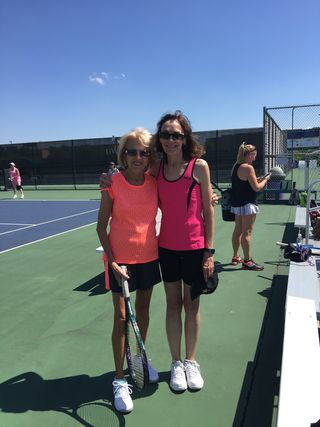Aging
How Can We All Become “Super Agers?”
Practice these simple strategies to keep the brain young.
Posted October 22, 2017
I just finished teaching our graduate level course on Aging and Epigenetics. During the final week, we focused on the concept of Super Agers. Researchers have discovered through fMRI’s that Super Agers who are in the 70s and 80s have the brains of 20-year-olds. What makes that happen?
I think one of the most important things we have to remember, whether we’re 20, 30, 40, 70, 80, or 90 years old, is the brain is an organ that can atrophy, as it really is a use or lose it organ. I've been saying this throughout the aging curricula, but cognitive decline does not have to be a normal aging change. We can all lose and make new brain cells every day. That's the process of neurogenesis.
Even on the day of our death, we can be learning something new. I vividly recall this example on the day my mother was dying. I didn't really know she was dying, but I knew something was wrong, and I had this intuitive gut feeling that I needed to go back to Wyoming. Of course, I couldn't get there in time, but I called her, and she picked up the phone. I said "Mom, what are you doing?" And you know what she was doing? She was writing a thank you note to someone in the church whom she thought was not appreciated enough. It was just the loveliest thing that I can remember. Also during those last few months of her life, Mom was reading Shakespeare. She was building neurogenesis to the end of her life.
So, one of the first aspects of a super ager is they know that the brain is a use it or lose it organ. Adopt the rule to never be bored. We make and lose new connections or synapses every day, as many as 20 million a day. That's incredible. The number one rule for super aging is to always be making new neuronal pathways, new synaptic connections, to compensate for those that are lost. Super Agers stated they enjoy learning new skills and embrace the uncomfortableness!
The second rule to super aging is the brain loves to be challenged. Sometimes what we do to our older persons is we think they aren't capable. We put them in a nursing home, and we let them sit, and they atrophy. Everything about them atrophies. Super Agers constantly challenge the brain in all aspects of life.
I am a huge fan of bucket lists. We need to have bucket lists every day of our life, so that we can continue to build new neuronal pathways. Learn a new skill. Gone are the days that used to believe “You can’t teach an old dog new tricks!” That is just not true. Daily neurogenesis, building new neuronal pathways, happens every day, if we challenge the brain and body and work them together.
We all need to have an enriched environment for the brain versus an impoverished environment. Too much environmental stress and very little life meaning also adds to brain disease. A few weeks ago, I was sitting in therapy with a client, she'd just lost her husband of 50 years. She was grieving and rightly despondent. She needed to put meaning back in her life. She's a nurse; she needs to be helping others. Not necessarily in nursing, but how can she have meaning back in her life? She needs to begin to enrich her environment again.
If you haven't learned something new today, you need to do that. The way we continue to build new neuronal pathways has to be practiced and repeated, so it becomes something that we actually remember.
The brain typically weighs about three pounds. Some people's brain, as you know, weigh a little bit less. Interestingly enough, Albert Einstein had a brain that weighed only two-and-a-half pounds. Through an autopsy, scientists found so many richly connected interconnections in the brain. His brain was dense, because he was constantly learning and doing.
So again, what do we do to become a Super Ager? I think we can be a Super Ager at 30 or 40 or 50 years of age. What we do today impacts how we turn out in our 80’s or 90’s. Exercise is the third big aspect of super aging. I exercise daily. In fact, I just got home from Tae Kwon Do. I've been doing Tae Kwon Do now for 20 years, and I'm a fifth-degree black belt. I really didn't want to go today, but I decided I can go. Today I can. I feel healthy. I went, and I feel like a million dollars, because we know that the minute I do Tae Kwon Do, I'm telling my body to wake up and learn. The minute I do Tae Kwon Do, all these brain derived neurotropic factors and proteins are just telling my body "good for you, be alert, live life."
Exercising daily is something that is so important to our brain. We now know that 20 minutes a day is probably what we need with one minute of high interval training to raise the heart rate. We know that also meditation helps. Quieting us down, giving us some moments of reflection so that our default mode network can self-reflect and think about how we fit into the world today is essential. We know that eating well and healthy sleep hygiene is a must for healthy living. Super Agers live life well, mindfully, intentionally and richly. This keeps neuronal destruction at bay. Here is a picture of a dear friend of mine, Carole, who is 78 years young. We are at a tennis clinic. She is amazing.

We know that cortisol is racing through our brains and body all the time. We have to learn to self-regulate. Remember, self-regulation builds intrinsic locus of control. Research has demonstrated that some stress helps the body/brain build resiliency, but too much is damaging.
We know that violence and trauma impact the volume of the brain, and it impacts the different neurotransmitters that are released in the brain. We know that trauma collectively harms the brain/body, makes the amygdala of the brain enlarge and the prefrontal cortex decrease. With too much trauma, there is a disconnect between the front and back of the brain. People finally instinctually start to react rather than respond.
Super Agers rely less on prescriptive medications, because of their lifestyles. Too much medication becomes very toxic to the system. I'm convinced that we rely too much on prescription medication and probably recreational drugs, as well, to help us self-medicate. Here's an example, in our Brain and Behavior course, I wanted everyone to play with the instrument called ResPerate. It is one of the only instruments that is approved by the FDA for blood pressure control. If used on a daily basis for a few weeks, blood pressure can be controlled through our breathing patterns and blood flow. Why aren’t more of us actively controlling our own blood pressure? Super Agers practice all aspects of aging, so many do not have to use medications for blood pressure control and other symptoms.
Click here for a fun video on Super Agers.
Dynamic Aging: Simple Exercises for Whole-Body Mobility by Katy Bowman and colleagues is an informative book about Super Agers. The authors describe how just moving differently can enhance our health and fitness.
Be sure to also check out the Online Counseling Program at Bradley University for more useful resources!
References
Bowman, K. et alt. (2017). Dynamic Aging: Simple Exercises for Whole-Body Mobility. Sequim, WA: Propriometrics Press.




